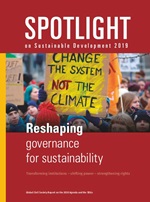Published on Sun, 2019-12-15 18:53
Global powers and Pacific Island nations are racing to divide up the ocean's resources using the narratives of Blue Economy and Blue Growth to justify their exploitation, argues Maureen Penjueli, of the Pacific Network on Globalization. Technology advances make once-unfeasible seafloor depths increasingly viable and will allow corporations to plunder oceanic resources in a bid to secure food security and alternative sources of minerals and energy for rapid growing populations. The Blue Economy concept grew out of the broader green growth concept and a growing concern about the heavy damage wrought on our ocean ecosystems by overfishing, habitat destruction, marine pollution, ocean acidification and climate change. |
Published on Mon, 2019-12-09 12:28
After 10 bi-annual sessions and a one-month open consultation, the Interagency and Expert Group on Sustainable Development Goals (IAEG-SDGs) has made important progress in finalizing its global indicator framework by which to measure progress towards the 17 SDGs and 169 targets at the global level. It has agreed on some additional indicators, including a few long sought by civil society organizations, and has upgraded or replaced indicators stalled at Tier III, a continual demand by Member States. But five years into the implementation of the SDGs, this process has raised new concerns. How has it helped advance progress on achieving the SDGs, particularly at the national level? Has it been overtaken by other assessments, including by UN bodies and the Global Sustainable Development Report, which seek to examine the obstacles to progress not included in the global indicator framework, such as external and global constraints as well as trade-offs as progress towards one goal may mean regression on another? |
Published on Sun, 2019-12-08 00:00
Are Finland and Norway a model to follow if you want to achieve sustainable development or an example of bad practices to avoid? It all depends who you ask. The two Nordic countries are listed among the top ten in the Global SDG Index1 published last September by the Bertelsmann Stiftung and the Sustainable Development Solutions Network (BS-SDGI). But they rank among the bottom 10 worst performers in the Sustainable Development Index (JH-SDI) published by anthropologist Jason Hickel in the January 2020 edition of the Ecological Economics Journal.2 |
Published on Sun, 2019-12-01 06:45
“The wealthy countries must begin providing public climate finance at the scale necessary to support not only adaptation but loss and damage as well, and they must do so in accordance with their responsibility and capacity to act.” This is the main message of a technical report titled Can Climate Change-Fuelled Loss and Damage Ever Be Fair?, launched on the eve of the UN Climate Change Conference (COP25) to be held in Madrid from 2 to 13 December. |
Published on Thu, 2019-11-21 14:00
Wicked Politics and Shaken Socio-Economy Since 17 October 2019, Lebanon has been witnessing a massive wave of unprecedented nationwide protests, which are deemed tomarka new era in its history. These protests are motivated by the direct repercussions of the economic and monetary crisis on the Lebanese population, but are indeed rooted in a structurally flawed economic system and wicked political practices and corruption embraced by the successive governments for decades. The protests ar widespread across the country and remain non-sectarian, marking the biggest postwar civil movement, as the Lebanese people overcome their religious and political divergences and join forces in an attempt to achieve real change. This change was long awaited by the Lebanese, and the civil society specifically that has been for years trying to promote partnerships and engage in policy making at different levels, despite the lack of serious and effective channels. |
SUSCRIBE TO OUR NEWSLETTER






